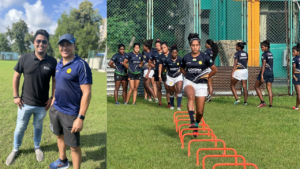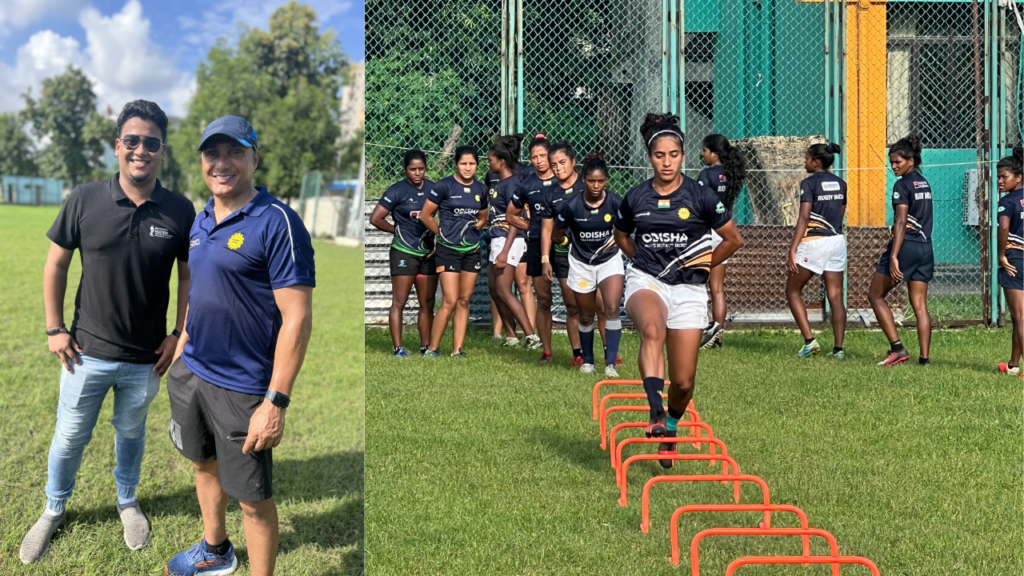
I was first introduced to Rahul Bose on the silver screen through the movie Chain Khuli Ki Main Khuli. The film revolved around the Indian cricket team captain, Varun Roy, portrayed by Rahul Bose, and a young orphan who stumbled upon a magical bat, ultimately leading the side to unprecedented glory. This film held a special place in the hearts of late 1990s and early 2000s kids. Later on, in the Bengali classics like Antaheen, The Japanese Wife and more. He always seemed a polished gentleman who consistently exuded an air of refinement and sophistication. I had the privilege of confirming that when I met him on Tuesday, September 12.
We had gone to visit the Indian women’s rugby team, currently undergoing a camp at the Sports Authority of India, Salt Lake campus, in preparations for the upcoming Asian Games. The idea was to get their journey documented and get both the players’ and the support staff’s stories, and of course the federation president’s.
I first came to know about Bose’s rugby career as a member of the Indian men’s rugby team and his journey to become the president of the federation while working on an exclusive interview given by him to RevSportz.
This interview shed light on India’s position in the global rugby arena and the clear vision that he, as the federation’s head, had for the team. What truly defined him was his unwavering clarity of thought, accompanied by concrete short-term goals aimed at achieving the ultimate objectives.
Giving insight to Bose’s playing career, he was the member of the first Indian men’s rugby team to play an international event, the Asian Rugby Football Union Championship, in 1998. He played as a scrum-half and also as a right winger. He was appointed the president of the Indian Rugby Football Union in December 2021. Under his presidential tenure, the Women’s 7s Rugby team has booked a place in the upcoming Asian Games and has been seeded 7th, which is a historic feat for the sport in the country.
A few days back, I got a chance to interview two members of the women’s rugby team, Sheetal Sharma, the skipper, and Hupi Majhi, a senior player. Both of these athletes held deep respect and admiration for Bose, as, in their nearly-decade-long careers, this was the first instance of players receiving compensation for playing rugby in India.
Coming to the experience at the SAI ground on Tuesday morning, it was 6:30am when we reached and the team was already warming up as Bose came and greeted us. While talking about the team, the one very noticeable thing was that the president knew each and every girl by name, and their stories by heart.
He was there for a cause, to improve Indian rugby. He knew that to keep a player in the game, basic security has to be provided. Most of the players come from very humble backgrounds, with many societal barriers. The solution was to empower these girls be the breadwinners of their families. And the story has changed. Full-time players with a full-time pay cheque, a figure expected to rise as the sport continues to grow. Nutrition was another major issue these girls faced, and now that too had been taken good care of by the federation.
There were a series of interviews of the team, with Boria Majumdar and Trisha Ghosal, and the details of the conversations will be out when the documentary airs, but what will always stay with me from this visit is the few lessons that Indian rugby’s ‘Rahul Sir’ illustrated. Throughout our visit, Bose displayed an unparalleled level of engagement. He was more than just the president; he was an integral part of the team. He lingered on the ground until every player had left, shared the same breakfast as the team, and even washed his own plate, as it was the hostel protocol.
His commitment extended to explaining the most intricate details of the game, enriching my understanding, which will make my rugby World Cup-watching experience even better. It’s rare to witness a president who would willingly demonstrate a specific movement by rolling on the field.
Rahul Bose sets a remarkable example of discipline and commitment, striving to propel the game forward. His perspective, and his ambitious mission and vision for Indian rugby in the years to come are truly commendable. With him at the helm, we can confidently declare that Indian rugby is in capable hands.




